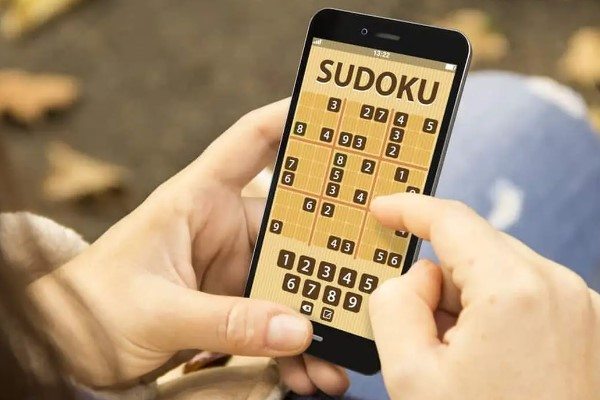Sudoku is a reasoning game that has fascinated people since it was created more than a century ago. Since then, it has been incorporated into several electronic games, such as the popular Xbox board game. Nowadays, Sudoku is available on smartphone and tablet screens, offering hours of free, mind-challenging fun.
Sudoku is a popular reasoning game, which was originally created in Japan in the early 80s. Its proposal is simple: solve a grid of 81 squares composing a 9×9 grid, so that each row, column and grid contains 9 different digits, between 1 and 9. Currently, there are several versions of this game, which makes it accessible to practically all users. Providing fun for thousands of people.
With the popularity of cell phones and tablets, several versions of the game are available for free download, bringing the fun and challenge of the game to the screens of our devices. In this article, we will show you some versions of Sudoku available for mobile devices and how you can enjoy the game to train your memory and reasoning skills.

How to play Sudoku?
The game is a number puzzle that involves placing numbers in a 9x9 grid. The grid is divided into nine smaller 3×3 squares. The aim of the game is to fill each empty cell with a number from 1 to 9, so that each row, column and smaller square contains all the numbers from 1 to 9 only once. To start playing, you must look at the grid and identify which numbers are already present in it.
Then start looking for the empty spaces and try to put a number that is not already present in the same row, column or smaller square. For example, if there is an empty space in a row, column, or smaller square that already contains the number 1, you cannot place the number 1 in that empty space. As you start filling in more empty spaces, solving Sudoku starts to get easier. You can start using more advanced techniques, such as eliminating numbers and applying specific rules to each empty cell. A useful tip for solving Sudoku puzzles is to start with the smallest squares, as they are the smallest and easiest to fill.
Then you can work across the rows and columns to fill in the remaining empty cells. When playing Sudoku, it is important to have patience and perseverance, as it is not always possible to solve the puzzle immediately. However, the more you play, the more skilled you become and the more challenging the solutions you come up with can be.
The benefits of gaming for the brain
The Sudoku game is one of the most popular puzzles around the world. This game of logic and reasoning has been studied by scientists and researchers who have discovered many benefits for the human brain. Firstly, Sudoku helps improve the brain's cognitive function, especially in areas related to memory, logical reasoning and problem-solving skills. Solving Sudoku puzzles involves applying various problem-solving techniques such as elimination, deduction, inference, and trial and error.
These cognitive skills help improve the brain's ability to process information and solve problems more efficiently. Plus, Sudoku is a great way to keep your brain active and healthy. As we age, our brains tend to lose some of their cognitive abilities. Solving Sudoku puzzles is a way to keep your brain in shape and help prevent neurodegenerative diseases such as Alzheimer's disease and dementia.
Another benefit of Sudoku is that it can help reduce stress and anxiety. Solving Sudoku puzzles is an activity that requires concentration and focus. When we focus on solving a Sudoku puzzle, we are able to let go of other worries and problems that may be causing us stress or anxiety. This can help improve mental health and overall quality of life.
Finally, the game can be a fun and challenging activity. Solving Sudoku puzzles can be a form of entertainment and a way to spend time productively. Furthermore, the more you play and solve Sudoku puzzles, the more skilled you become and the more challenging the games you decide to play can be.
Tips for doing well at Sudoku
The Sudoku game is a puzzle that requires logical thinking and problem-solving skills. To be successful at Sudoku, here are some tips that can help:
- Start with the smaller squares: as mentioned previously, the smaller squares are the simplest and easiest to fill in. Starting with these can help you get an idea of which numbers are missing in the rows and columns.
- Mark the possibilities: Instead of immediately filling in the numbers you know, try marking all the possibilities for each empty cell. This will help you better visualize which numbers are still possible for each cell, which can help eliminate the wrong possibilities and eventually solve the puzzle.
- Look for patterns: Sudoku puzzles have patterns that serve to solve the puzzle more efficiently. Look for smaller rows, columns, or squares that contain many numbers already filled in. This can help you more quickly identify missing numbers.
- Don't be afraid of trial and error: Although logic and deduction are important in Sudoku, sometimes you have to make attempts to find the correct solution. Don't be afraid to erase the numbers you filled in and try again if you realize you made a mistake.
- Practice, practice, practice: As with many things in life, practice makes perfect. The more you play Sudoku, the more skilled you become at finding solutions to more difficult puzzles.
With these tips, you can start solving Sudoku puzzles more efficiently and eventually become a skilled and experienced player. Remember that the key to success at Sudoku is patience, perseverance and practice.
Conclusion
In short, the game offers many benefits to the human brain, including improving cognitive function, preventing neurodegenerative diseases, reducing stress and anxiety, and having fun. Solving Sudoku puzzles can be an effective way to keep your mind active and healthy, while having fun at the same time. You can download this game from Google Play or on the App Store for free. Finally, discover other useful platforms in the “games” from our portal.



